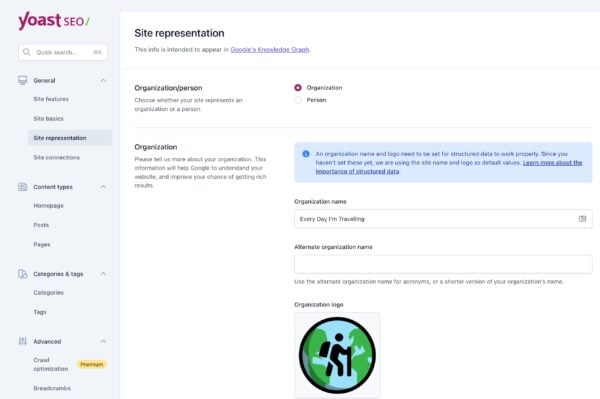Google’s algorithm is smart and dumb at the same time

Google is smart, amazingly smart. The algorithm is very close to reading texts like human beings. At the same time, parts of Google’s algorithm aren’t smart at all. Computers aren’t good at understanding ‘what is what’ on a page. If you have a recipe site, you’ll need to tell Google what an ingredient is, what the preparation time is and what a photo of your recipe is. Otherwise, Google will not understand that properly. Quite the contradiction: amazingly smart on the one hand, pretty dumb at the other! In this post, I’ll dive deeper into this and give you some practical tips on using Google’s excellence and flaws to your advantage.
Amazingly smart in understanding text
Google reads texts. And overall, Google’s algorithm is trying to mimic a human. We’ve known for a while that Google reads texts. And we know that Google is getting better and better at parsing text and matching keywords and search queries with results.
In the early days, Google could only understand the basics of language. It could recognize words. That’s why it was a common SEO practice to focus on mentioning your keywords over and over in a text. The Panda update was one of the first indications that Google was getting better and better at understanding texts. The Hummingbird update and the recent BERT update make it even clearer that Google is amazingly smart in understanding text and the meaning of different words.
The consequence of Google getting better at understanding language is that the demands for web texts get higher. You cannot get away with a text that is poorly written or over-optimized for a certain term. To have a chance in the search engines, your text should be original, easy to read and findable.
Incredibly dumb in understanding structure
Google and its algorithm need help to correctly understand ‘what is what’ on websites. Knowing what is most important and what is of less importance. Understanding what a heading is, what an image is, and what things mean on a page: Google needs metadata to understand all that. That’s basically what Schema does. It’s a way of helping Google grasp the meaning of your page by using structured data. Structured data can be seen as pieces of code you add to your site that let search engines know the meaning of your content.
Google knows about the weak spots of computers. Computers need much more metadata and help in understanding structure than humans do. That’s why Google is investing in Schema. Tools like Schema are actively improving the parts in which computers and search engines are flawed.
The consequence of Google improving upon its flawed understanding of context and structure is that site owners need to use Schema. They need to up their game in that respect as well. You cannot compete in the search engines anymore without implementing Schema the right way on your website.
3 practical tips to help with your ranking
Knowing what parts of Google’s algorithm are smart and which parts of the algorithm require a bit of attention could pay off to your advantage. If you write awesome content and help Google with a correct Schema-implementation, you’re really increasing your chances of ranking in the search engines.
Get started with your site’s basic Schema settings by doing the Yoast SEO first-time configuration. The first-time configuration will help you to get everything set up correctly, and then we can start outputting the right structured data for your site automatically! You can access the configuration anytime by going to Yoast SEO -> General -> First-time configuration tab.
1. Schema and Schema Blocks
Structured data gives search engines more insights into how your pages are built and how you describe your content. If you implement your Schema correctly, you could have these awesome rich results.

And what do you think about having a knowledge panel like this?

Implementing Schema.org helps Google figure out what is what on a page. And using Schema could be rewarding because you end up with such nice rich results. Schema is a piece of code that lets search engines know the meaning of your content. With Yoast SEO, you don’t have to write any code, though. The only thing a site owner has to do is give us some input: choose whether your website represents a person or an organization. The tool will automatically add the necessary structured data that search engines need.

There are various types of Schema, depending on what you want to describe. Yoast SEO has some awesome structured data blocks that’ll make it super easy to implement that Schema on your website. With the blocks, you can create pages that contain specific types of structured data, such as an FAQ or How-to. That will increase your chances of qualifying for rich results.
2. Writing a readable text
With Google’s algorithm getting more and more able to understand texts, you must improve. Make sure to spend some time on your SEO copywriting to write a text that is nice and easy to read. Make sure you write something that your audience wants to read. It should be fresh, new, and original. Your text should have a good structure. Paragraphs should follow each other in a logical order.
The Yoast SEO readability analysis can really help you write a text that is nice and easy to read. It can be hard to comply with the analysis, especially if you have a complicated topic you’re writing about. Shortening your sentence is a good way to make a text readable, even though the topic is really hard. And, if your topic is hard, your readability is even more important: people should use their precious cognitive load to understand the topic instead of your difficult sentences. Right?
3. Optimize in a natural way
Optimizing your content should never compromise the readability of your text. Google’s algorithm is much too smart for you to get away with a text stuffed with keywords. Instead, you should ensure that your text is focused on a clear topic and use lots of related keywords and relevant synonyms.
The use of a focus keyword will remain important because the words your audience uses in their search query are of importance. For example, they could search for ‘cupcakes’ instead of ‘fairy cake’. In that case, you’re better off focusing on the keyphrase ‘cupcakes’. Connecting to the vocabulary of your audience is really important. That’s why you should always do keyword research. Get inside the heads of your audience, use the words they’re using. They’ll recognize what they’re searching for if you use the right terms.
Trying to optimize your text for a specific keyphrase feels a bit outdated. The exact matching keywords become less and less important. That’s why our plugin recognizes different word forms. It can recognize plurals, past tense and different word orders. And it’s able to take related keywords and synonyms into account. Optimize your text for a certain keyword, but never overdo it. Make sure to add a lot of words that are logically related to the keyword as well. The most important tip here: don’t turn optimizing your text for the search engines into a trick. Have focus, but try to write the text naturally.
Conclusion on Google’s algorithm
Google’s algorithm is amazingly smart. It’s insane how much the algorithm can understand. You’ll need to have well-written texts optimized naturally to stand out in search engines. At the same time, Google needs some help understanding a webpage’s structure. Implementing Schema.org will help Google with that. Make sure to match Google’s strengths by writing the most amazing texts and help Google’s flaws by implementing structured data on your site. Good luck!
Read more: A brief history of Google’s algorithm updates »


Google needs help to understand that Facebook users aren’t necessarily spammers. Every time I get a lot of referrals from FB, Google shuts down my ads.
Sorry to hear that, Lisa! Although I would love to, I’m afraid I can’t help you with that. Lots of luck and I hope your issue will be resolved soon!
Amazing article. Although we have already implemented Schema.org tag on our education based platform and we are getting amazing performance report using this markup.
That’s great to hear, Kumar. Keep up the good work!
Thank you. This is the start of my learning curve for SEO.
You’re welcome, Annette! We also have an SEO tutorial for beginners that can tell you more. Good luck :)
Thanks for sharing this information. Hopefully, it will be helpfull
You’re welcome, Chris! And good luck :)